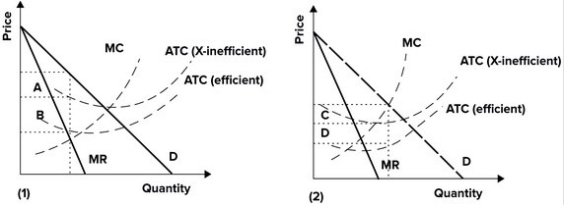Exam 16: Real-World Competition and Technology
Exam 1: Economics and Economic Reasoning158 Questions
Exam 2: The Production Possibility Model, Trade, and Globalization133 Questions
Exam 3: Economic Institutions163 Questions
Exam 4: Supply and Demand182 Questions
Exam 5: Using Supply and Demand163 Questions
Exam 6: Describing Supply and Demand: Elasticities216 Questions
Exam 7: Taxation and Government Intervention201 Questions
Exam 8: Market Failure Versus Government Failure197 Questions
Exam 9: Comparative Advantage, Exchange Rates, and Globalization118 Questions
Exam 10: International Trade Policy99 Questions
Exam 11: Production and Cost Analysis I194 Questions
Exam 12: Production and Cost Analysis II152 Questions
Exam 13: Perfect Competition170 Questions
Exam 14: Monopoly and Monopolistic Competition274 Questions
Exam 15: Oligopoly and Antitrust Policy142 Questions
Exam 16: Real-World Competition and Technology108 Questions
Exam 17: Work and the Labor Market150 Questions
Exam 18: Who Gets What the Distribution of Income131 Questions
Exam 19: The Logic of Individual Choice: the Foundation of Supply and Demand170 Questions
Exam 20: Game Theory, Strategic Decision Making, and Behavioral Economics103 Questions
Exam 21: Thinking Like a Modern Economist97 Questions
Exam 22: Behavioral Economics and Modern Economic Policy126 Questions
Exam 23: Microeconomic Policy, Economic Reasoning, and Beyond134 Questions
Exam 24: Economic Growth, Business Cycles, and Unemployment124 Questions
Exam 25: Measuring and Describing the Aggregate Economy229 Questions
Exam 26: The Keynesian Short-Run Policy Model: Demand-Side Policies220 Questions
Exam 27: The Classical Long-Run Policy Model: Growth and Supply-Side Policies133 Questions
Exam 28: The Financial Sector and the Economy214 Questions
Exam 29: Monetary Policy243 Questions
Exam 30: Financial Crises, Panics, and Unconventional Monetary Policy109 Questions
Exam 31: Deficits and Debt: the Austerity Debate150 Questions
Exam 32: The Fiscal Policy Dilemma119 Questions
Exam 33: Jobs and Unemployment78 Questions
Exam 34: Inflation, Deflation, and Macro Policy175 Questions
Exam 35: International Financial Policy211 Questions
Exam 36: Macro Policy in a Global Setting134 Questions
Exam 37: Structural Stagnation and Globalization125 Questions
Exam 38: Macro Policy in Developing Countries142 Questions
Select questions type
Briefly describe the monitoring problem as it applies to the managers of corporations.Why is this problem so severe in large corporations?
(Essay)
4.8/5  (41)
(41)
The profit-maximization assumption of economic theory does not fit reality because:
(Multiple Choice)
4.8/5  (34)
(34)
What is the monitoring problem,and how does it relate to the standard economic model of the firm?
(Essay)
4.8/5  (35)
(35)
-Refer to the graphs shown.  The maximum profits that an efficient monopolist that produces a profit-maximizing quantity could earn is best shown by the area:
The maximum profits that an efficient monopolist that produces a profit-maximizing quantity could earn is best shown by the area:
(Multiple Choice)
5.0/5  (30)
(30)
In practice, regulatory boards try to set the price of a natural monopoly so that price:
(Multiple Choice)
4.7/5  (37)
(37)
An agreement in which the incentives of both parties match their goals as closely as possible is:
(Multiple Choice)
5.0/5  (33)
(33)
Describe two things firms do to try to break up a monopoly.Give an example of each.What can monopolists do to try to keep other firms from taking away some of their markets?
(Essay)
4.8/5  (40)
(40)
Economic reasoning predicts that there will be strong pressures to make real-world markets perfectly competitive.
(True/False)
4.9/5  (39)
(39)
Often,if a monopoly exists,other firms try to figure out how to break it up - to get a share of the monopolist's profit.Describe two things firms do to try to enter a monopolized industry.Give an example of each.
(Essay)
4.9/5  (43)
(43)
Real-world competition should not be viewed as a static condition but rather as a fight between the forces of monopolization and the forces of competition.
(True/False)
4.9/5  (49)
(49)
It is not uncommon for businesses to pay contingent bonuses that depend on performance. Contingent bonuses are an example of what the text calls:
(Multiple Choice)
4.9/5  (32)
(32)
The fact that U.S. managers' salaries are substantially higher than the salaries of comparable managers in Japan may be related to the fact that:
(Multiple Choice)
4.8/5  (34)
(34)
Once a firm has a monopoly it often has to worry about other firms trying to get a piece of its action.Describe three things monopolists do to try to keep other firms from getting a share of their markets.Discuss how much a monopolist would spend on any of these tactics.
(Essay)
4.8/5  (36)
(36)
Suppose a lazy monopolist's fixed costs are higher than the fixed costs of an efficient monopolist. In all other respects the monopolists are the same. Which of the following statements about this lazy monopolist is true?
(Multiple Choice)
4.9/5  (32)
(32)
Which of the following is a legal right to control who may produce a good?
(Multiple Choice)
4.9/5  (40)
(40)
In natural and platform monopolies, economists argue that regulation:
(Multiple Choice)
4.8/5  (39)
(39)
Showing 21 - 40 of 108
Filters
- Essay(0)
- Multiple Choice(0)
- Short Answer(0)
- True False(0)
- Matching(0)